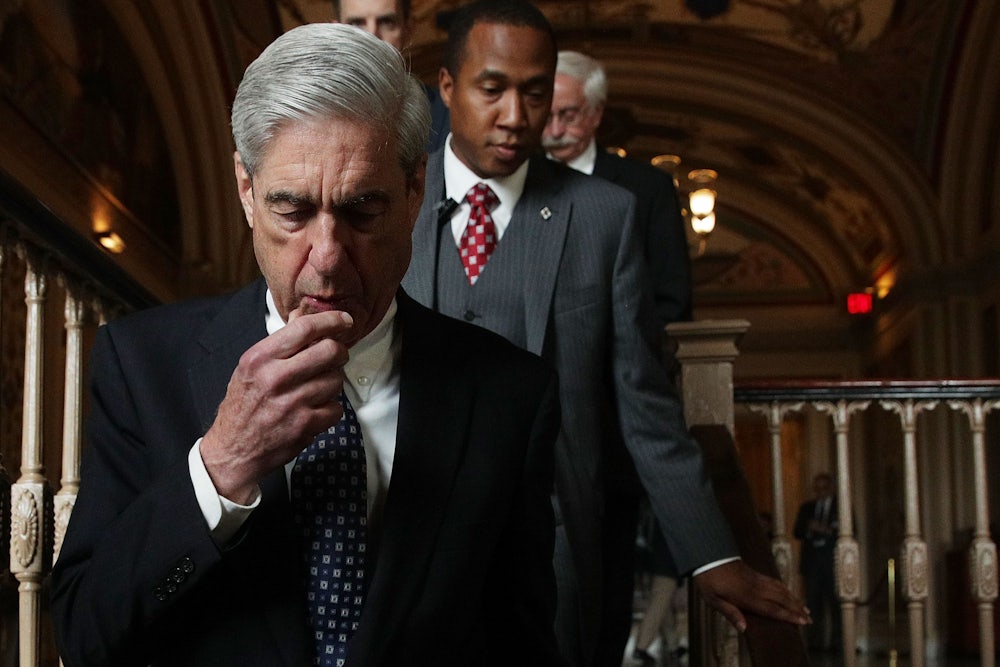With President Donald Trump reportedly contemplating radical measures to defend his beleaguered administration from investigation, the United States stands on the brink of a constitutional crisis. According to The New York Times, Trump’s staff is trying to dredge up opposition research to discredit special counsel Robert Mueller’s legal team on the investigation into the Trump campaign’s collusion with Russia in last election’s election interference. The Washington Post reports that Trump has inquired as to whether he can pardon associates, family members, and himself. And firing Mueller is a real possibility. As the New Republic’s Brian Beutler argued last night, there’s every indication that the Republican-controlled Congress will give a pass to these abuses of power, edging the American republic closer to authoritarianism.
Bob Bauer, former White House Counsel to President Barack Obama, wrote Thursday on the blog Lawfare that Trump’s gambit would end the investigation and leave only impeachment as a remedy, with Trump counting on Republicans in the House and the Senate to support him no matter what. This could pay off if the Republicans stay in line ahead of the 2018 midterm elections: at worst, if the Democrats took back the House, Trump would be impeached, but would remain in power since Democrats won’t have the two-thirds votes necessary in the Senate to remove him. Last night, Emma Loop of BuzzFeed interviewed four Republican senators about whether firing Mueller would be a mistake. Only one, Marco Rubio of Florida, unequivocally said yes.
All of this suggests that the constitutional crisis is also a political crisis. Democrats and the larger resistance needs to make Mueller the next big political battle. Defending the special counsel goes beyond defending one single investigation; it would be a proxy for a larger effort to guard the rule of law from a president with authoritarian aspirations. It would also be aimed at the Republican Party, letting them know that if they refuse to stand up to Trump’s thrashing of the rule of law, they will be held accountable at the election booth.
Politically, the time is right for such a pivot. The special congressional elections are in the rearview, all the key races lost, and the battle against Obamacare repeal appears to be ending with a Democratic victory. The party has the resources—the money for advertising, and energized activists for street protests—to pour into a major effort. It is time to make saving Mueller’s job the focus of a nationwide campaign.
One of the main reasons for mobilizing immediately is to elevate Mueller as a public figure—to make him a household name—so that firing him would become a more politically costly act. If Trump fires Mueller before the Democrats can make it a national issue, then the public will be playing catch-up with the story. The better known Mueller is, the more costly his firing would be to Trump.
Some opponents of the Trump regime are already discussing how to defend Mueller. One obvious way is with street protests. Neera Tanden, the president of the Center for American Progress, has the right idea here—
If Trump fires Mueller, we are going to have to have massive street demonstrations. Who is with me in taking to the streets?
— Neera Tanden🖖🏼 (@neeratanden) July 21, 2017
—except that we should not wait for Trump to fire Mueller. To truly provide Mueller political protection, the street protests should start this weekend.
Another way to shield Mueller would be for prominent figures to promote Mueller’s stellar reputation, thereby inoculating against any calumny the Trump team might bring. Former Attorney General Eric Holder tweeted on Thursday night:
There is NO basis to question the integrity of Mueller or those serving with him in the special counsel's office. And no conflicts either
— Eric Holder (@EricHolder) July 21, 2017
Preet Bharara, the former U.S. Attorney for the Southern District of New York, is also thinking along these lines, suggesting that high-level Department of Justice officials be prepared to resign if Mueller is fired:
If Mueller is fired, how much obscene & horseshit character assassination will Trump & allies level against this honored military vet? 3/X https://t.co/1WKSffFGic
— Preet Bharara (@PreetBharara) July 21, 2017
Beyond these actions, Democratic representatives and senators can raise a fuss in the halls of Congress, forcing their Republican counterparts to defend Mueller’s job. If Republican lawmakers don’t take a stand, and Mueller is fired, they’ll be tainted as enablers in the next election.
Trump’s recklessness is raising the stakes, such that the only eventual remedy may be impeachment. The claims that Trump and his legal team are putting forward are already radical: that Trump can’t be charged with obstruction of justice because it’s in his power to terminate an investigation at any time.
As Bauer wrote of Jay Sekulow, Trump’s personal attorney in the Russia investigation, after the lawyer made the TV rounds on Sunday: “He is building the case for dismissal with all his claims against Mueller and others of ‘conflicts’ [of] interest, and he reaffirms in the interview that he has that authority: ‘[I]t can’t be obstruction because you can say: It’s ended. It’s over. Period.’” Bauer adds:
Few lawyers would say that the president helped his legal position with this interview. It may be that he only cares so much about the substance if he has concluded that he can end it all, “period,” terminating the investigation and then daring the Congress to impeach him. He would then have put the law behind him and it would be all politics. In the end, though he came close, Nixon would not go that far. As president and as “client,” Trump is different.
Trump, if this account is accurate, is preparing to drive the political system over the cliff. Democrats must try to be the brakes, and they need to slam on them right now.
